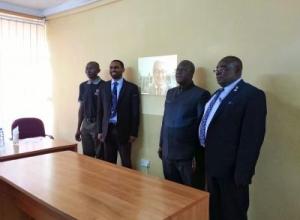Aug 13 2014
The IAU strategic plan was ratified by its members in 2009, at its General Assembly. Since then a global coordinating office (the OAD) was established in Cape Town, South Africa, and has led the implementation of this plan. Other regional nodes have already been established in China for the East Asian region, Thailand for the South East Asian region and Ethiopia for the East African region.
 In this picture taken at the signing ceremony the following people appear (from left): Professor Frank Tailoka (Dean of School of Mathematical and Natural Science, CBU), Kevin Govender (Director, IAU Office of Astronomy for Development), Piero Benvenuti (Assistant General Secretary, International Astronomical Union, over video link), Professor Naison Ngoma (Vice Chancellor of CBU) and Allan Ilunga (Registrar of CBU). Credit: IAU/M. Mutondo
In this picture taken at the signing ceremony the following people appear (from left): Professor Frank Tailoka (Dean of School of Mathematical and Natural Science, CBU), Kevin Govender (Director, IAU Office of Astronomy for Development), Piero Benvenuti (Assistant General Secretary, International Astronomical Union, over video link), Professor Naison Ngoma (Vice Chancellor of CBU) and Allan Ilunga (Registrar of CBU). Credit: IAU/M. Mutondo
The establishment of this Southern African regional node is significant as this part of the continent is currently very active in terms of the development of world-class astronomy facilities, including the optical Southern African Large Telescope (SALT), the radio Karoo Array Telescope (MeerKAT), the gamma-ray High Energy Stereoscopic System (HESS) as well as the Square Kilometre Array. The office in Zambia will exploit all these advantages to benefit the region at large.
Director of the OAD, Kevin Govender, comments on the signing of this agreement: "Zambia is ideally positioned to play a leadership role in this field. Not only is it a part of the Square Kilometre Array project, but its consistent commitment to develop astronomy capacity nationally serves as an example to other countries in the region. Since the International Year of Astronomy in 2009 we have seen Zambia represented in various global astronomy education and outreach projects. Their experience and dedication to the field of astronomy will be a great benefit to the region."
This office will also reach out to other countries in Africa which, like Zambia, form part of the Square Kilometre Array (SKA) project. This is a key task to ensure that all countries involved in the SKA have the skills and personnel required both to derive maximum benefit from the major telescope project and to help make the SKA a scientific success.
The Dean of the School of Mathematics and Natural Sciences at Copperbelt University, Professor F. P. Tailoka adds: "The Copperbelt University and the country at large are delighted to host the Southern African Regional Office of Astronomy for Development. We are pleased to be part of the implementation of the IAU's strategic plan. We are a partner country of the Square Kilometre Array which gives us an opportunity to participate in world-class astronomy research. We look forward to see the Zambian community, and the rest of the region, realising the benefits of astronomy."
Signing the agreement on behalf of the IAU, Assistant General Secretary Piero Benvenuti said:
"Astronomy is possibly the most ancient science and the IAU is committed to maintain and spread worldwide this precious heritage. But astronomy is not only pure science, it is a fascinating cultural adventure that engages the entire society and brings many benefits. It has a powerful attraction for young people, encouraging them to follow mathematical and scientific curricula, and it fosters advanced technological developments."
This agreement follows the IAU's Announcement of Opportunity which remains open to letters of intent and proposals from all around the world to host similar nodes. The partners of this regional node will establish a steering committee which consists of relevant expertise and representation.